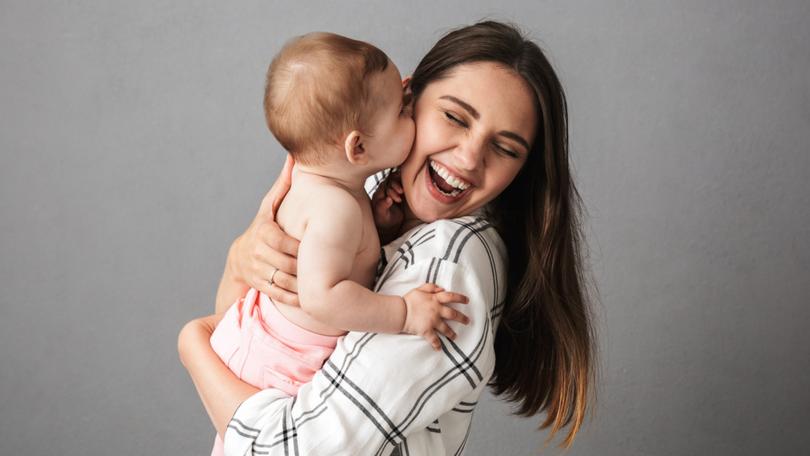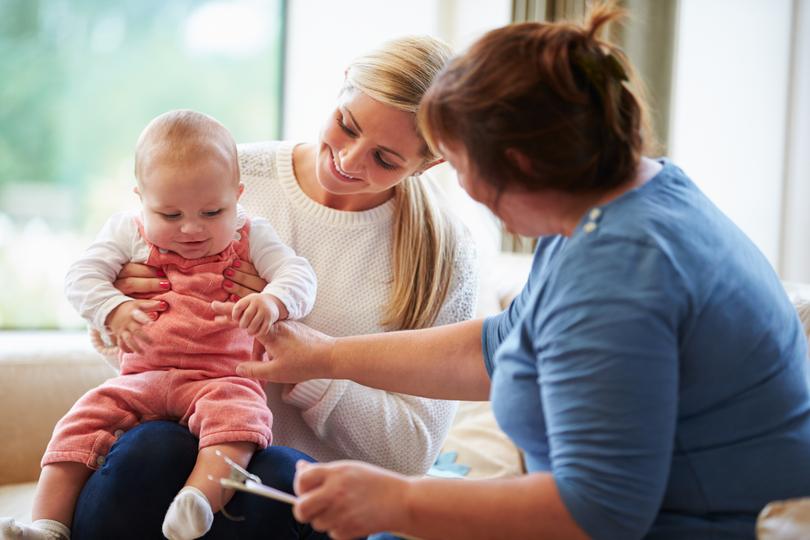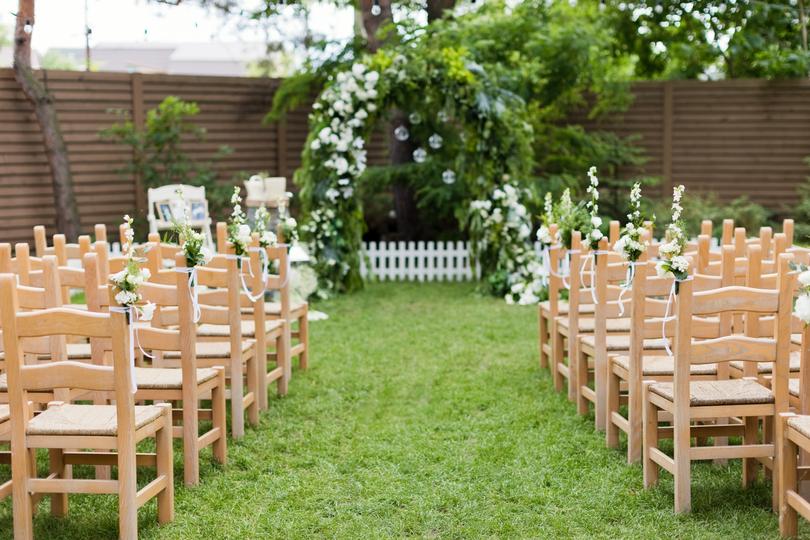KARA KENNEDY: Gen Z want to marry and have kids young so we don’t end up like ‘lonely, childless Millennials’
KARA KENNEDY: I married at 25 and had a baby within a year. Every other 20-something Gen Z woman I know wants to do the same so we don’t end up like lonely, childless Millennials!

When I got married at 25 — within four months of meeting my husband — and then fell pregnant six months after the wedding, my friends’ reactions were split down the middle.
Those in their 30s and 40s were horrified. What was I thinking? I was practically a child bride, a teen mother! How would I work, or travel? I couldn’t possibly be ready for such a huge life step.
But my Gen Z peers were far more sanguine.
Sign up to The Nightly's newsletters.
Get the first look at the digital newspaper, curated daily stories and breaking headlines delivered to your inbox.
By continuing you agree to our Terms and Privacy Policy.Why not embrace the joy of motherhood while you’re still young, they said. Why not jump into the big life stuff now?
For the truth is, my generation don’t recognise the stereotypes that are so often trotted out about us: lonely, selfish, lazy, entitled, snowflakes. Every other 20-something I know has thrown in the towel when it comes to casual sex and instead is dating to marry.
We all want lots of kids, some as many as six, and realise the time to get on with it is now.
Doom-mongering predictions of a huge demographic slump are certainly premature among my friends.
The view from Gen Z is simply a return to what has been true all along — people yearn for love and companionship, and figuring out who to commit to is one of the most consequential things anyone will ever do. That’s why we need to take it seriously — and instead of dithering, grab it when we see it. Indeed, a survey published this week revealed that young adults today are more in favour of getting married than they were 20 years ago, when almost 39 per cent thought marriage was ‘irrelevant’.
As Gen Z shifts towards having a more conservative view of relationships, the research by The Times also showed a third thought it better for a couple to be married before having children. As I did. It’s a position we’ve come to despite everything our parents and older friends tell us.
When my husband and I met, we still adhered to the view that in a world of such overwhelming online choice, it was nigh-on impossible to find the love of your life, let alone decide the timing was right to bring little people into the world. It’s what Millennials, aged between 30 and 44, had been telling us for years, after all.
Committing to one person seemed like an outlandishly old-fashioned thing to do. But then, after a few weeks together, we realised that maybe all those people who had done it before us — our grandparents and great grandparents — might have had a good reason to. Maybe they were happier and healthier for it.
This is in stark contrast to the generation above us, in their mid to late 30s, who are only just trying to find a suitable partner after spending their 20s turning up their noses at anything serious. It seems that no matter how well their career is going, how big their flat is, or how much life experience through travel and adventures they gain, they never quite feel ready to settle down.
Watching them, my cohort has learned that time ticks on, and if you want two or three children, you need to start seriously thinking about it in your 20s.
Too many older women I know feel totally lied to by those around them who said they shouldn’t rush into marrying and starting a family because the choice would always be there. But it’s not — no matter how many eggs you freeze. It wasn’t my plan to start at 25, but I’m so glad I did.
This may surprise you, but my friends and I want nothing more than to settle down in a monogamous marriage with a few offspring to spend Saturday nights in front of the TV with.
And pregnancy is contagious. When you start having kids, so do your friends. I have several who want six or even more children.
I don’t think I’ll be bringing up a football team, but I know I’ll do my part with two or three. Our parents — Gen X-ers or Boomers — roll their eyes at this, perhaps fearing they’ll be landed with overwhelming grandparenting duties.
They can’t imagine how we’ll pay for childcare costs and sigh when we suggest staying at home and looking after our children ourselves might not be the end of the world. More than one child doesn’t have to mean bankruptcy.

One of my girlfriends is pregnant and has a three-year-old. She’s never put him in a nursery or had regular childcare because she and her husband work from home and juggle between them. If she really needs help, she asks one of her neighbours to step in for an hourly fee. We do the same, more or less. It’s why I don’t worry about the ‘motherhood penalty’ that holds women back at work and stops them getting promoted.
The reality is the men of my generation are more willing to step up than our dads ever were, and my husband and I share the childcare between us.
On the more extreme side of the debate, of course, there are the ‘anti-natalists’ — those who believe having children is unethical because of climate change and babies being unable to consent to the act of being born. Some even believe getting married and having a child is an act of oppression and patriarchy (an attitude that has contributed to the UK — for now at least — having the lowest birth rate on record).
Then there are the people, both female and male, who are more honest with themselves —they want to travel, to prioritise their career or simply don’t want marriage and children. To be clear, I think it’s fine if people don’t want to start a family, and feel sad for those who want one but can’t.
But I do believe that most of the single and child-free people I know in their 30s and 40s would be happier, more capable and resilient, if they had to navigate a committed, long-term relationship and everything that comes with it, including children.
For me, I am a far better, nicer and more competent person since I decided to share my life with someone. As for the logistical trade-offs, frankly you find time you didn’t know you had (I’m writing this while running back and forth to soothe my teething baby).
We don’t mind hard work when it’s in the service of people we love. While most modern parents strive for 50-50, sometimes you have to accept that one of you will be doing a little more. In my household, I do slightly more childcare but my husband cooks and cleans. And so we are all changing our habits.
In the past few years, two of my friends have decided to stop having casual sex until they find their ‘one’. They aren’t calling it ‘saving themselves for marriage’ — no, it’s the new cringeworthy Gen Z buzzphrase ‘celibate summer’ — but the point still stands. The new survey shows they aren’t alone, with only 23 per cent of 18 to 27-year-olds saying their friends commonly had sex on a one-night stand — a steep fall from the 78 per cent of Millennials who said yes to that question 20 years ago.
There is also a big change in how young people date. They are ditching the dating apps that Millennials so enthusiastically embraced as they yearn for real, human interaction. Over the years I’ve had female friends tell me they had ‘completed Tinder’. One recently told me that the act of swiping pictures of men’s faces made her feel ‘totally disconnected’.
She swears she’ll never use a dating app again and now, at the age of 29, is only entertaining offers from men who are ‘husband material’. There is also a change in expectations when it comes to what commitment means.
For a Gen Z-er, a ‘perfect’ wedding isn’t an extravagant or expensive affair, but is thrown together at the last minute, full of blunders. The generation of people brought up on Instagram and Pinterest don’t need a fancy wedding planner, but a few thousand pounds and a mood board.
My wedding was in the back garden of the house we’d moved into the week before, only a few months after my husband and I had started dating.

My two closest girlfriends also married their partners on the cheap after less than nine months of dating. Gone is the Millennial trend of ‘going out’ for five (or ten) years before popping the question.
Gen Z women are far too protective of their feelings — and time — to be in eternal girlfriend mode, and the boys are happy to oblige.
In fact, in my experience, and again contrary to every Gen Z generalisation, the young men are always the ones racing to pop the question and buy the house.
They, too, see no point in delaying real life but are getting stuck into it, perhaps fearful they’ll otherwise get left behind. Zoomers — another label for those born between 1997 and 2012 — are romantic, and our attention spans are shockingly short.
One of my guy friends proposed to his girlfriend after eight months, to the day, because she said there was no chance of her getting engaged before then.
A cynic might say we’re only prepared to get married so quickly because divorce is so easy nowadays, and completely shame-free. There was a time when a previously married person was treated, socially, as damaged goods.
When my husband’s parents got divorced 30 years ago, it was a scandal. And it’s true that, as much I am surrounded by young people getting hitched, I am also witnessing an avalanche of divorces among friends and older acquaintances.
Some are even throwing parties for them, not flippantly, as a celebration of failure, but as friends supporting each other after a tough time.
The truth is, Gen Z represents just the second cohort of adults who have grown up in the world of the internet and all things online.
If Millennials were the first, we have learned from their mistakes — their commitment-phobia; and their prioritisation of feelings over action.
We’re rejecting their tentativeness and deciding that perhaps our (great) grandparents were right all along when it comes to putting love and marriage at the centre of life.
My peers have found a new hobby: trying to negotiate how to be together, where to live, how to manage work and money fairly, and how to make a home. And while we have our faults, our respect for family life surely isn’t one of them.
